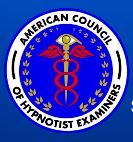The Truth About Hypnosis
The opinions expressed in this article are the author’s own and do not necessarily reflect the view of the American Council of Hypnotist Examiners.
There has been some recent poor PR about hypnosis. A case in Florida involving a principal who used hypnosis on students and teachers has been recently been in the news. The families of three North Port High School students who died after being hypnotized by former Principal George Kenney will receive $200,000 each from the Sarasota County School District under a settlement agreement unanimously approved by the School Board at its meeting last Tuesday night. The Board stated that they just want to put the events behind them.
The $600,000 settlement closes a year long case that began after former North Port High School Principal Kenney admitted he hypnotized 16-year-old Wesley McKinley a day before the teenager committed suicide in April 2011. A subsequent investigation found that Kenney hypnotized as many as 75 students, staff members and others from 2006 until McKinley’s death. One basketball player at the school said Kenney hypnotized him 30 to 40 times to improve his concentration. Among those who were hypnotized were 17-year-old Brittany Palumbo and 16-year-old Marcus Freeman. Palumbo committed suicide in 2011. Freeman was in a fatal car accident after apparently self-hypnotizing, a technique Kenney taught the teenager, also in 2011.
The case was settled without going to trial, but has raised concerns about the safety of hypnosis. Hypnosis…the very word conveys dramatic images. The public either imagine a strange character waving a pendulum or a group of silly people on stage acting like ducks or chickens. Both of these images imply that hypnosis can be used to control your mind. Nothing could be further from the truth. No one can ever use hypnosis to control another person. As we know the individual gives their permission when they are being hypnotized. In fact all hypnosis is self-hypnosis and it is an incredible tool for managing the mind.
“Contrary to how hypnosis is sometimes portrayed, you don’t lose control over your behavior while under hypnosis,” experts at the Mayo Clinic write. “You generally remain aware of and remember what happens under hypnosis.”
The human mind and its processes have always seemed as mysterious and fascinating as the universe itself, but the investigation of the nature of the mind has become the province of experimental science only during relatively recent times. The scientific approach has paid rich dividends in knowledge. During the last century, we have discovered that mental processes connect to emotional experiences and affect the patterns of health and disease.
“Hypnosis is a mental state, not, per se, a treatment,” says Dr. David Spiegel, medical director of the Center for Integrative Medicine at Stanford University School of Medicine. “People think it is a means of taking away control, but it is actually a means of enhancing control over perceptions such as pain, anxiety, habits, stress.”
More and more as we move into the 21st century, we have become aware that there is a tremendous connection between what happens in our minds and how it affects our bodies. Most of our serious diseases are thought to have mental and emotional factors. Some of the latest research on creating wellness talks about beginning with our minds. Visualization techniques are being widely used to fight disease. There are also many non therapeutic uses of hypnosis in sales, business and sports that enhance performance and improve success.
It is in some ways unfortunate that the case in Florida never came to trial. Hypnosis was tried in the court of public opinion and was found guilty by association. It does not mean that hypnosis caused these events. We must continue to educate the public in the incredible benefits of hypnosis. It is important that we, in the ACHE, continue to stand for the highest standards in hypnosis education.
When the public chooses an ACHE hypnosis practitioner, they are choosing a highly skilled and ethical professional.
Zoilita Grant
Vice President
American Council of Hypnotist Examiners

